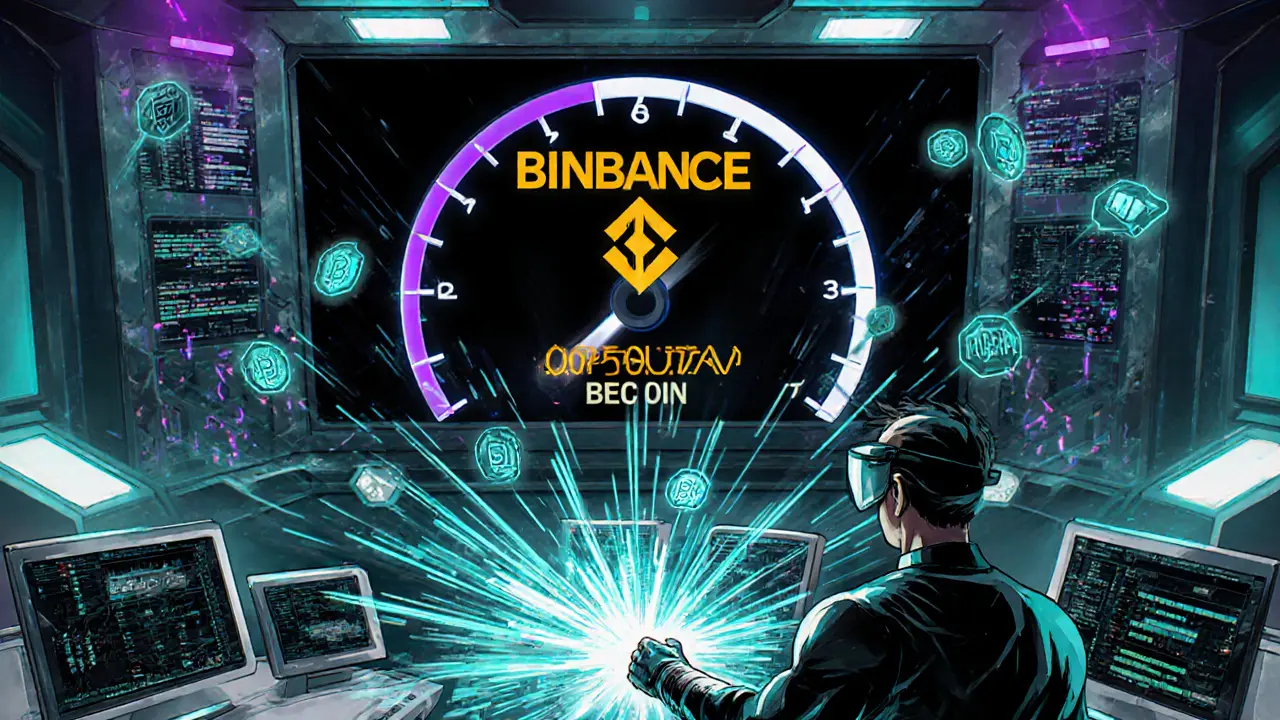BST Chain (BSTC) Asset Backing Calculator
Token Information
Asset Backing Analysis
Enter values and click Calculate to see asset backing analysis
When you hear the phrase “asset‑backed crypto,” you probably picture a token linked to gold or real‑estate. BST Chain (BSTC) is marketed as the world’s first complete ecosystem that fuses real‑world assets-real estate, gemstones and even smart‑city infrastructure-with the speed of the Binance Smart Chain.
Key Takeaways
- BST Chain runs on Binance Smart Chain, promising low‑cost, fast transactions.
- Its native token, BSTC, is positioned as an asset‑backed utility token.
- The project claims a 100,000‑TPS mainnet, though independent verification is scarce.
- Price data varies widely across trackers, indicating low liquidity.
- Community presence is minimal, so prospective users should proceed with caution.
What Exactly Is BST Chain?
At its core, BST Chain is a hybrid decentralized platform created by The BST Group. The group was founded by Dr. Farooq Abdal with co‑founder Mohammed Iqbal Khohar. Their public narrative frames BST Chain as a bridge between physical assets-like real estate and gemstones-and a digital ledger that can settle cross‑border transactions in seconds.
Technical Backbone: Binance Smart Chain
Unlike Bitcoin’s proof‑of‑work or Ethereum’s proof‑of‑stake, BST Chain leverages the Binance Smart Chain (BSC). BSC is known for sub‑one‑second block times and transaction fees that often stay below a cent. The BST Group claims that their own mainnet layer can handle up to 100,000 transactions per second (TPS), a figure that would dwarf most public blockchains. However, no third‑party audit or performance benchmark has been published, so the claim remains largely anecdotal.
How Does the Asset‑Backed Model Work?
The “asset‑backed” label suggests that every BSTC token is tied to a tangible item. In theory, the BST Group purchases a parcel of land, a batch of raw gemstones, or invests in smart‑city infrastructure, then issues BSTC tokens that represent a fractional ownership stake. Token holders could, in principle, redeem their BSTC for a share of the underlying asset, or simply use the token to pay for services within the ecosystem.
Because the project is still early‑stage, detailed audit reports of asset custody, legal ownership structures, or compliance with local property law are not publicly available. This lack of transparency is a red flag for anyone looking for a truly backed stablecoin‑style token.
Market Data: Prices, Rankings, and Liquidity
Tracking BSTC’s price feels like chasing a moving target. LiveCoinWatch lists a daily high of $1.49 and ranks the token somewhere between #13,600 and #16,200 in market cap. Binance’s own price directory shows a current price of $3.000591 with an all‑time high of $7.002858, yet reports a circulating supply of zero-an obvious data inconsistency.
CoinMarketCap places BSTC around #7,800, but offers no concrete price figure. These discrepancies usually signal extremely low trading volume, meaning that even a modest buy‑or‑sell order could move the price dramatically. For day‑traders or investors seeking liquidity, the token currently looks risky.

Use‑Case Scenarios the Team Highlights
| Industry | How BSTC Is Supposed to Add Value | Current Public Evidence |
|---|---|---|
| Real Estate | Fractional ownership of property assets, faster cross‑border settlement. | Project claims only; no property registry links. |
| Gemstone Trade | Tokenized gemstones with provenance tracked on‑chain. | Few partnerships announced, no third‑party verification. |
| Smart Cities | Utility payments, infrastructure financing via BSTC. | Conceptual roadmap, no pilot projects disclosed. |
How to Acquire and Store BSTC
Because the token runs on BSC, any wallet that supports BEP‑20 tokens should technically hold BSTC. Popular choices include Trust Wallet, MetaMask (when configured for BSC), and Binance Chain Wallet. However, the official BST Chain documentation does not list recommended wallets, nor does it provide a step‑by‑step onboarding guide.
On the exchange side, BSTC is not listed on major platforms like Coinbase or Kraken. Some smaller, often unregulated exchanges claim to list it, but their credibility is questionable. Always verify the contract address directly from the project’s official channels before transferring funds.
Comparison With More Established Tokens
| Token | TPS (claimed) | Asset‑Backed? | Blockchain | Typical Price (USD) | Liquidity Rank |
|---|---|---|---|---|---|
| BSTC | 100,000 (unverified) | Yes - real estate, gems, smart‑city projects | Binance Smart Chain (BEP‑20) | ~$3 (highly variable) | #7,800‑#16,200 (low) |
| Bitcoin (BTC) | ~7 | No | Bitcoin PoW | $27,000 | #1 (very high) |
| Ethereum (ETH) | ~30‑45 (after upgrades) | No | Ethereum PoS | $1,800 | #2 (high) |
| Tether (USDT) | ~65 (across multiple chains) | Yes - fiat reserves | Multiple (ERC‑20, BSC, TRC‑20) | $1.00 | #3 (very high) |
The table highlights that BSTC’s primary differentiators are its claimed speed and asset‑backing. Yet, its market depth and real‑world usage lag far behind established players.
Community, Governance, and Transparency
Cryptocurrency projects thrive on open communities: Reddit threads, Discord channels, developer repos, and regular roadmap updates. BST Chain’s social footprint is thin. A quick search on major forums returns almost no organic discussion. The official Telegram and Twitter accounts post occasional announcements but lack detailed technical documentation, audit reports, or governance proposals.
Without a transparent voting mechanism or a published roadmap, it’s hard to gauge who controls protocol upgrades or how token holders can influence the ecosystem. This opacity is another factor to weigh before allocating capital.
Potential Risks and Red Flags
- Data inconsistencies: Conflicting price and supply figures across trackers suggest very low liquidity.
- Unverified performance claims: 100,000 TPS has not been independently audited.
- Asset custody uncertainty: No public registries or legal documents prove that real‑world assets back the tokens.
- Limited community: Sparse user‑generated content implies low adoption and support.
- Regulatory gray area: Asset‑backed tokens often trigger securities regulations, yet no clear compliance info is available.
Should You Consider BSTC?
If you’re an early‑adopter who loves exploring brand‑new ecosystems and you have a high risk tolerance, you might allocate a tiny speculative amount to test the waters. Keep in mind that the token’s price can swing wildly on a single trade, and you may find it hard to exit.
For most investors-especially those seeking stability, liquidity, or proven technology-the safer bet is to stick with assets that have transparent audits, real‑world usage, and robust community support. BSTC currently lacks those fundamentals.

Frequently Asked Questions
What is the main purpose of BST Chain?
BST Chain aims to create a crypto ecosystem where each token is tied to physical assets-real estate, gemstones, or smart‑city projects-while offering fast, low‑cost transactions on Binance Smart Chain.
How can I buy BSTC?
The token is a BEP‑20 asset, so any wallet that supports Binance Smart Chain can hold it. However, it is not listed on major exchanges; you’ll need to find a smaller, often unregulated exchange that lists BSTC and verify the contract address yourself.
Is BSTC really backed by real assets?
The project claims that each token represents a share in physical assets, but no independent audits, legal registries, or custody reports have been published to prove the claim.
What is the claimed transaction speed?
BST Chain’s team says its mainnet can process up to 100,000 transactions per second, but no third‑party verification exists.
Is BSTC a good long‑term investment?
Given the limited liquidity, lack of transparent asset backing, and minimal community, BSTC is considered high‑risk. Most analysts recommend allocating only a small speculative amount, if any.


Mark Briggs
July 7, 2025 AT 14:18Sounds like another hype pump.
Rebecca Stowe
July 11, 2025 AT 15:32Honestly, it’s cool to see new ideas trying to blend real assets with crypto. If it works, it could open doors for more people.
Angela Yeager
July 15, 2025 AT 16:45The concept behind BST Chain is intriguing because it attempts to tie tangible assets like real estate and gemstones to a digital token, which could, in theory, give holders a more stable value proposition than typical meme coins.
However, the lack of audited proof of asset custody is a serious red flag; investors need transparent registries showing exactly what is backing each token.
When a project claims 100,000 TPS without third‑party verification, it feels like marketing hype rather than a technical breakthrough.
Liquidity is another concern: the disparate price listings and near‑zero circulating supply suggest that even tiny trades could dramatically swing the price.
From a regulatory standpoint, asset‑backed tokens often fall under securities laws, yet BSTC provides no clear compliance roadmap.
On the upside, building on Binance Smart Chain does give users low‑fee, fast transactions, which is a practical advantage if the ecosystem ever gains traction.
Community engagement appears minimal; a vibrant developer and user base is essential for long‑term adoption.
For those who love high‑risk, high‑reward projects, a tiny speculative position might be acceptable, but it should never exceed what you’re willing to lose.
In summary, the idea has potential, but the execution, transparency, and market depth are currently lacking.
vipin kumar
July 19, 2025 AT 17:58Every time I see a token claiming real‑world assets, I wonder who’s actually holding the paperwork. The whole thing could be a front for moving money under the radar.
Lara Cocchetti
July 23, 2025 AT 19:12It’s morally dubious to market a token as asset‑backed without showing any proof; investors could be misled into thinking they own a slice of property when they don’t.
Gaurav Gautam
July 27, 2025 AT 20:25I get the excitement around merging physical assets with blockchain, but we need concrete audit reports to feel safe. Without that, it’s just speculation.
Donald Barrett
July 31, 2025 AT 21:38This looks like a classic pump‑and‑dump scheme; the hype is there, the fundamentals are not.
Christina Norberto
August 4, 2025 AT 22:52While the proposal is ambitious, the absence of verifiable asset documentation renders the claim of backing tenuous at best.
Fiona Chow
August 9, 2025 AT 00:05Interesting concept, but the lack of clear audits makes it feel like buying into a mystery box.
Aditya Raj Gontia
August 13, 2025 AT 01:18From a technical standpoint, the token uses BEP‑20 standards, which is straightforward, but the real issue lies in the opaque asset claims.
Kailey Shelton
August 17, 2025 AT 02:32Seems like another project with big promises and little substance.
mannu kumar rajpoot
August 21, 2025 AT 03:45People should be careful; without legal proof, this could be a way to funnel investments into unregulated channels.
Tilly Fluf
August 25, 2025 AT 04:58While the idea is promising, I would advise waiting for third‑party audits before committing any funds.
Shanthan Jogavajjala
August 29, 2025 AT 06:12Hype without data is just noise.
Millsaps Delaine
September 2, 2025 AT 07:25The allure of a “first asset‑backed crypto” is certainly captivating, especially for those of us who have grown weary of the endless parade of utility‑less tokens flooding the market. However, one must ask whether the romanticized vision of merging tangible assets with digital finance truly translates into a viable economic model. The projected 100,000 TPS claim, while impressive on paper, lacks any independent verification and thus resides more in the realm of aspirational marketing than demonstrable engineering. Moreover, the glaring inconsistencies in circulating supply data across major aggregators signal a profound liquidity issue; it is not unheard of for a token under these circumstances to experience price volatility with just a single modest trade. Asset custody remains another opaque area: the absence of public registries, audit reports, or even basic legal documentation effectively renders the “backed” narrative unsubstantiated. From a regulatory perspective, the token’s structure could easily attract scrutiny under securities law, yet no compliance roadmap or legal counsel has been disclosed. On a practical note, the reliance on Binance Smart Chain means low transaction fees, which is a plus, but this alone does not compensate for the overarching deficiencies. Community engagement is markedly thin; a thriving ecosystem typically boasts active developer contributions, vibrant discussion forums, and transparent governance mechanisms, all of which are scarcely evident here. Consequently, while the project’s ambition is laudable, the current execution falls short of offering a compelling proposition for serious investors. In short, treat this as a high‑risk speculative play, and only allocate capital you can afford to lose.
Jack Fans
September 6, 2025 AT 08:38Indeed, the speculative nature is evident; anyone considering an investment should prioritize thorough due diligence.
Adetoyese Oluyomi-Deji Olugunna
September 10, 2025 AT 09:52Without solid verification, the whole premise feels like a mirage.
Krithika Natarajan
September 14, 2025 AT 11:05Clarity on asset ownership would go a long way toward building trust.
Ayaz Mudarris
September 18, 2025 AT 12:18From an analytical perspective, the project's lack of transparent auditing procedures introduces a level of systemic risk that cannot be ignored; investors should consider the probability of regulatory challenges as well as market acceptance hurdles when evaluating potential ROI.
Irene Tien MD MSc
September 22, 2025 AT 13:32It’s fascinating how quickly hype can turn into a financial vortex when the underlying fundamentals are as nebulous as a cloud on a summer afternoon, making one wonder whether the allure of asset‑backed tokens is driven more by the seductive promise of stability than by any concrete, verifiable backing.
kishan kumar
September 26, 2025 AT 14:45Indeed, the allure can mask substantial risk. 😊
Anthony R
September 30, 2025 AT 15:58Transparency is key; without it, confidence erodes rapidly.
Vaishnavi Singh
October 4, 2025 AT 17:12A cautious approach seems warranted given the current information landscape.
Linda Welch
October 8, 2025 AT 18:25Honestly, this feels like a nationalistic cash grab disguised as crypto innovation; the lack of clear data suggests it’s more about hype than substance.
Kevin Fellows
October 12, 2025 AT 19:38Even if it’s risky, you never know – maybe it’ll surprise us all!